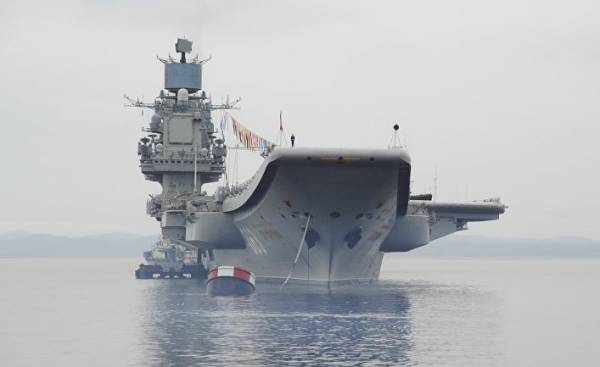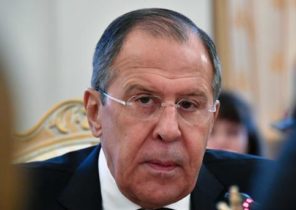
Russia’s military budget were reduced by 5% for the first time in almost twenty years. This means that the Kremlin is forced to make difficult decisions to prioritize the needs of defense. And since Russia is expanding military capabilities on the continent, she had to moderate their Maritime ambitions. However, to fully of Russia from the seas will not refuse: the most serious security challenge Moscow still considers nuclear deterrence, which includes underwater nuclear fleet. About the military plans of the Kremlin, which is likely to leave among its priority objectives, and Ukraine, referred to in the forecast the us private intelligence analysis company Stratfor, which is in the order of “Apostrophes”.
Russian military modernization is entering a decisive phase. State program of armaments (GPV) covering the years 2018-2025, should be completed in September. The new plan will be to determine not only the possibility of arming countries in 2030-ies, but also the strategic direction of development of the Russian troops in General. First signs point to a significant decline in Russian naval ambitions since Moscow has focused on continental power.
Russia estimates, in what direction will develop its armed forces over the next few years. Therefore, I believe in Stratfor, the main limitation for the Kremlin will be financial. Due to the sharp decline in oil prices in 2014, Russia’s defense budget, the rapidly growing for nearly two decades, began to face significant difficulties. The highest point of the problem has reached this year: the Kremlin has reduced the military budget by 5%. The first from 1990-ies, the reduction means that Russia will not be able to achieve its official goal is to modernize 70% of its armed forces by 2020. It is expected that total funding of weapons programs in the years 2018-2025 will be only half of the amount hoped for by the defense Ministry. Therefore, the Kremlin will have to make difficult decisions about what first direct military investments. Economic turmoil and problems of the industry have already postponed the completion of the SAP for two years, and Russia can no longer defer action on his military future.
Sinking ship
Meanwhile the bulk of the Russian Navy desperately needs funding. Despite the fact that in the last decade has been implemented the program of modernization of the Navy, for the most part it is based are still small or old warships. After the end of the cold war the Russians have not built new types of surface warships, which would be more of a frigate, and the country’s only aircraft carrier “Admiral Kuznetsov” was launched in 1985. If Moscow wants to have a powerful ocean-going Navy with large surface ships and aircraft carriers, it is necessary to allocate heavily on the Navy in the SAP 2018-2025 years.
However, according to analysts Stratfor, it is clear that the necessary funding will not be allocated. It seems that the defence Ministry gives preference to already initiated (and therefore less risky) weapons programmes before the new. This puts the Russian Navy at a disadvantage, because after the collapse of the Soviet Union was not a single major programmes, concerning surface ships. Moreover, the limited defense budget will be focused on cost-effective weapons systems rather than on expensive flagship program, which will eliminate the enormous costs of large warships. In addition, the Vice Prime Minister of Russia Dmitry Rogozin as a key figure involved in the military industry, said in may that unlike USA, Russia is not a naval power. He stressed that Russia is a continental power, questioning that Russia needs a new aircraft carrier. Meeting in mid may the President of Russia Vladimir Putin and the military confirmed these statements. Russian media later announced that the development of destroyers and the new aircraft carrier will be postponed for an indefinite period.
To invest where you want
However, at least one marine dreams Russia will not lose from reductions in the nuclear submarine fleet. Lately the main issue of defense was nuclear deterrence, which includes land-based missiles, nuclear bombers and submarines with nuclear ballistic missiles. During the cold war, nuclear submarines were so valuable that the Soviet surface fleet was more or less as auxiliary weapons underwater. In the coming years, this deterrent will be as important for the armed forces of Russia, suggested to U.S. intelligence and analysis company.
It seems that LG will not only provide sufficient funding for the nuclear submarine fleet, but also to further strengthen the air force. The Kremlin will have to invest more in strategic transport aircraft and advanced military aircraft with an emphasis on the modernization of fourth generation planes, but not on the newer more advanced models, such as a stealth fighter T-50. Russia also will focus on investments that will help to make its air and ground forces more agile, flexible and lethal, including precision-guided munitions, enhanced use of electronic warfare, modernized equipment and control space assets and improved intelligence and oversight mechanisms, namely unmanned aerial vehicles.
As for the regions that are most likely to benefit from LG, it is expected that Russia will focus on the southern and Western military districts. They are responsible for important operational areas, including the Baltic States, Ukraine and the Caucasus. The Kremlin will also give priority to the Arctic United strategic command “North”, which will receive the status of a military district by 2020. It includes the main part of nuclear forces of Russia and is consistent with the strategic direction of the armed forces.
In Stratfor believes that the defence priorities of Russia reflect the fact that the authorities perceive as the biggest threat to security. From the point of view of Moscow, the main danger remains the encroachment of NATO on the Western flank of the Russian Federation, which requires enhanced nuclear deterrence, enhanced lethal ground and air weapons. Russia is developing missions that involve the transfer of forces to distant regions — from the Arctic to Syria, if there is a user-friendly environment. Based on this, the Kremlin will focus on creating a flexible ground forces with advanced strategic air transport fleet. In the end, Russia will recognize that it is impossible to be both a great marine and a great continental power.







